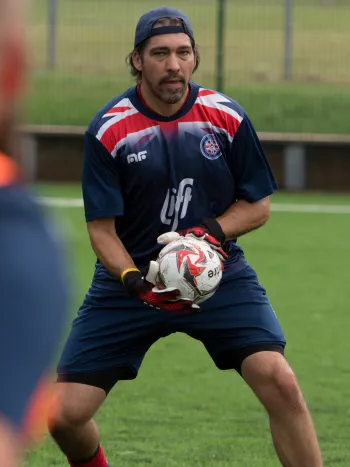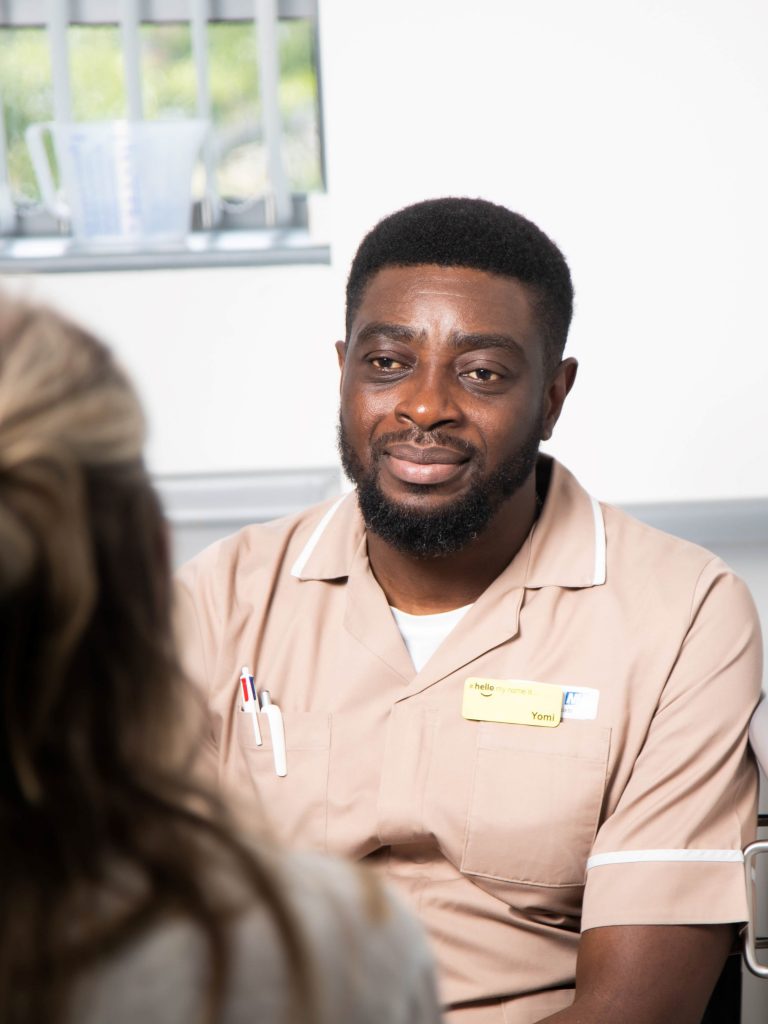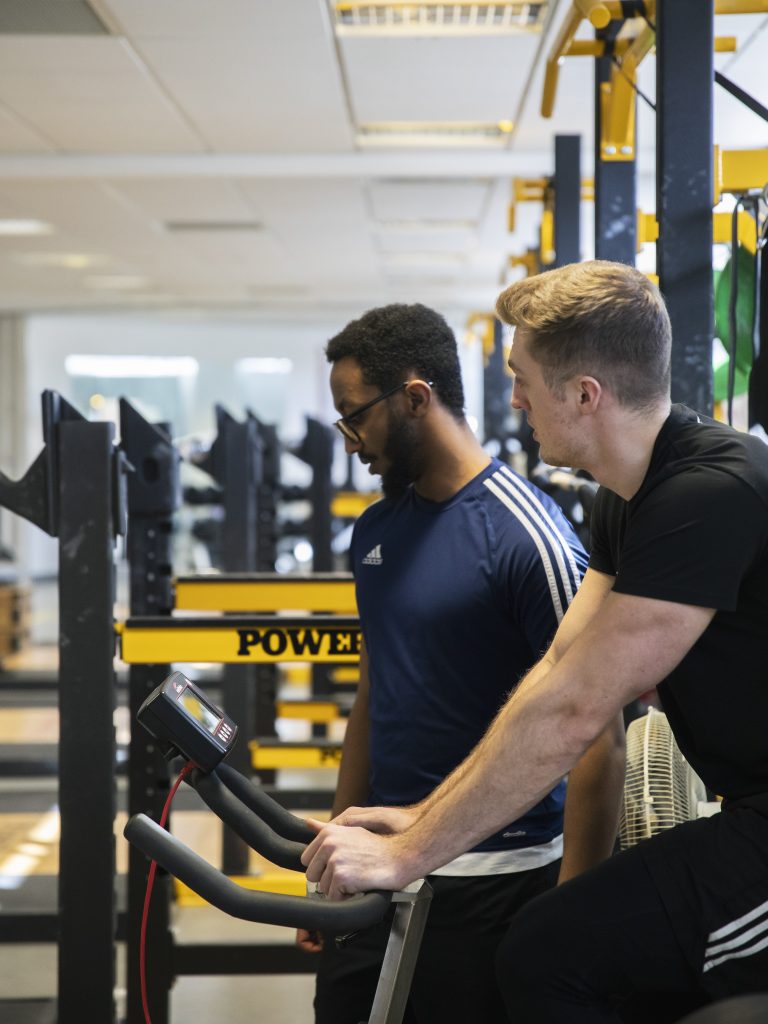Men’s Health Week (10-16 June 2024) is designed to give boys and men access to the information, services and treatment they need to live healthier, longer and more fulfilling lives. We asked our Salford staff members for their experiences concerning key health issues which have a big impact on men’s health and wellbeing. Here are their stories…
Tim’s story
Throughout Tim’s life, he has faced a lack of understanding around his diabetes, but has since gone on to find his community – both in and out of the workplace. Tim’s story is one of hope. Read how he moved from initial shame and stigma to a place of acceptance and openness about being diabetic.

“When I was diagnosed with type one diabetes at five years of age, not much was known about the condition. There was only really one way to manage it: monitoring my blood with finger-prick testing, and regulating my insulin with injections.
After I left university I tried to hide the fact I was diabetic from friends and even employers. I was worried about being treated differently or being viewed as “less capable” than other people. Sometimes though, it was impossible to hide – like when I worked for a travel company as a holiday rep. The demands of the job and soaring Greek temperatures saw me collapse due to a drop in blood sugar. Back then the company I worked for viewed it so negatively and expressed doubts about me being up to the job.
This made me feel as though I had to mask it even further, so when I first met my wife I did my best to disguise it. However, she’s a nurse who’d worked with many patients with diabetes so not much gets past her!
Always on my mind
My family are really supportive but this still doesn’t come without its challenges. My youngest son has seen me collapse due to low blood sugar levels, and, as if being a parent isn’t tiring enough, my condition often leaves me completely exhausted.
I also have to continually think about my blood sugar levels and ensure that they stay within the right range, as going too high or too low causes issues. Thankfully technology has moved on since my childhood diagnosis. Instead of me having to do finger-prick testing I now wear a device which continually monitors my glucose levels and even beeps if it goes outside of the safe zone. Sometimes my colleagues hear it and say “Tim, you need to check your blood sugar!”. It’s even connected to an app so now and again I get a reminder text from my wife!
Whilst I’m able to talk openly about my condition now, there’s still stigma that exists around being diabetic. I wear a wristband saying “I’m not drunk I’m diabetic” because if my glucose drops very low, I can stumble and slur my words. It would be easy for a stranger to assume I’d had a few too many, when in fact I’d need medical help. The exhaustion can make it really difficult to concentrate and I need to nap during the day in some instances, so I worry about people thinking that I’m lazy. Because I’m 6 ft 4 and look “OK” on the outside, people assume that I’m healthy. It’s important to remember that not all disabilities are visible. The media spreads negative misinformation as well, as they make out like it’s self-inflicted and people who are diabetic bring it on themselves with bad food choices. That’s just not true.
Meeting the Dream Team
Something really life changing happened in 2018. My wife was on Facebook and saw that a Diabetic Futsal team called DiaEuro were looking for players. It was even in Worcester where I went to university. Initially I laughed it off as it looked like I was a good ten years older than most of the squad, but my wife told me to get myself down there and give it a go!
My worst fears were realised when I found that the squad was full of ex-professional sports people! It was founded by semi-professional footballer Chris Bright who has type one diabetes, so the calibre was high! However, I was soon put at ease when I saw how welcoming everyone was. This was leading up to the DiaEuro World Cup. After trials, I was selected for the team, and played my first game in Slovakia!

It’s more than just a football team though. We’re a support network for each other. We’re on a WhatsApp group where we share tips, ask questions and talk about our condition. The group has over a hundred members now. It grew massively during Covid as it stopped people feeling isolated. It’s really been a lifeline.
Making Workplaces Workable
In the workplace, there are some simple reasonable adjustments that really help me manage my condition. Home working and flexibility are key, as I can manage my day much better than when I’m on campus. I also have to try and be strict with my boundaries, saying no to meetings that run over lunchtimes. Lunchtime is my opportunity to refuel properly and stabilise my blood sugars for the rest of the day. Even stress can impact my blood sugar, so I really have to try not to get worked up about things. It really is a massive, daily balancing act!
Opening Up
My one piece of advice to someone who is newly diagnosed as diabetic, or ready to face their diagnosis would be not to hide away from it. I spent years trying to mask the condition and it quite literally made me unwell.
I’m pleased that I can now have open conversations with people at the University who are also diabetic. I’ve even wondered about setting up a staff network as I bet there are so many people who work here with the same condition. It would be great to create a support network so that people felt comfortable talking openly and sharing knowledge and advice with a likeminded community.”
Laura’s story
Laura* has had vast experience supporting men’s treatment in sexual health clinics. Her partner James* was diagnosed with kidney cancer in 2019, and they lost their dear friend to the same disease.
Laura explains the importance of men taking control of their health, removing stigma around men’s health issues, and visiting their GP when they feel something isn’t quite right.

“James was always very active with football and would tend to eat one meal a day. When he began experiencing rapid weight loss, despite his eating and exercise habits not changing, this was a worry. Once he began having loose stools and changes in his need to pass urine, accompanied by back pain, I started nagging him to get to the GP.
After an initial appointment on Thursday, he was sent for investigations on the Friday, and we were fast tracked to a Monday appointment by the consultant. Further tests showed that there was a mass inside James’ kidney which was going to need surgery. We were incredibly fortunate that the cancer hadn’t grown and spread to his lymph nodes. If he’d left this any longer it could have, so I’m pleased I nagged him to get it investigated.
Sadly, our friend Paul was not as fortunate. He experienced many of the same symptoms as James, and saw everything that James went through, yet delayed going to see his GP. Paul found out too late that he had kidney cancer. We sadly lost him just seven weeks after his diagnosis.
Things need to change culturally around men and their health. There are a number of barriers in the way when it comes to men accessing health care such as…
- Preventative thinking: There are less proactive opportunities for men to engage with their health compared to women i.e. fewer screening programmes and less engagement with their GP overall.
- Stigma: Many men don’t visit their health practitioner for fear of embarrassment around the issue, or fearing “wasting the time” of the doctor.
- Socio-economic: In a culture where the majority of men still tend to be the “breadwinner” there is a reluctance to take time off work to resolve health concerns, especially for those with hourly paid contracts.
Playing football again has helped James immensely, talking openly to his teammates and encouraging them to prioritise their health. The advice I’d give is to engage with your GP or health practitioner regularly and think proactively about your health. Having worked in sexual health settings, I know sexually transmitted infections don’t always present symptoms but can lead to infertility. It’s important to get tested if you feel you have been exposed to the risk of infection.
Above all else, please listen to your body. Don’t ignore symptoms in the hope things will go away. The majority of the time they won’t! Don’t go Googling it either, as this isn’t a substitute for a visit to a clinician. As for the embarrassment factor, believe me when I say that there’s nothing us nurses haven’t seen. When we’re looking at a health concern we’re not judging you, we simply want to help you however we can.
Jane’s story
Research shows that losing just 5% to 10% of your body weight may improve mental health and reduce your risk of cardiovascular disease and certain cancers.
Jane* shares her husband’s story of incredible weight loss, and the value in not giving up when times get tough…

“I was keen to share my husband’s difficult journey and the positive place he is now in. He is a severe asthmatic and has been for all his life, receiving steroid treatment long term for his asthma. In 2017 he developed a condition called Cushing’s syndrome and his adrenal glands packed in completely. His hormone levels were severely imbalanced, and he suffered with extreme tiredness. This resulted in him being absent from work for almost a year.
Rather than take regular cortisone medication, he decided to attempt to re-awaken his adrenal glands. He joined our local Slimming World group to lose weight he had gained during his illness. He combined this with exercise and took up mountain biking which he enjoyed with his friends.
Unfortunately, he broke his knee in a biking accident meaning that I was his primary carer and chauffeur for that period. He is having his hip joints monitored as he will need a hip replacement in the next 3-4 years.
My point in telling this story is that even if you have a number of health issues, never give up. You will find a way through. My husband changed jobs, has made friends through Slimming World and is enjoying life every day. We anticipate future health matters to address, but with his amazing five stone weight loss, he feels ready for it. As I remind him every day, life is not a rehearsal!”
*Names have been changed for anonymity.
Thank you to Tim and our two anonymous colleagues for sharing their stories. Men’s Health Week may be over, but it’s important to prioritise your health and wellbeing year-round. Visit our website for healthy living guides, services and available support.